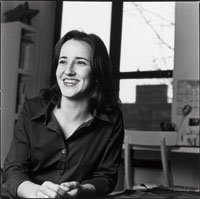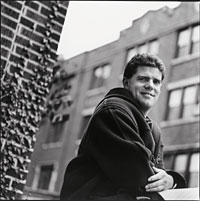What I did
last summer
From combating a health crisis, to tailoring
products for new markets, summer internships let these Kellogg
School
students practice their team leadership
By Kari Richardson Forget Popsicle days and lazy afternoons whiled away by
the swimming pool. When classes end for the summer, a legion
of Kellogg School students lend their expertise to companies
big and small, both for- and nonprofit firms, looking to
test the lessons of the past academic year. It's a proving ground for both companies and the business
school students they hire: Will the students be able to synthesize
what they've learned in a real-world setting? Will the companies
and industries these students choose live up to expectations?
 |
|
© Nathan Mandell
Marina Barreto '04 |
|
| |
|
A summer internship helps MBA students confirm that a career
in a particular industry is the right path for them, says
Roxanne Hori, director of the Kellogg
School's Career Management Center. Alternately, the internship gives students a chance
to opt out of a field gracefully, before they accept a full-time
offer.
"It's a chance to take a peek at a job function," Hori
says. "It's also a chance to take a peek at the cultural
factors that sometimes get obscured during the recruitment
process." Second-year student Tom Bolling, for example, was drawn
to the energetic and friendly culture at Brunswick, a maker
of boats, motors and other leisure products, during the recruiting
process. That impression stuck as Bolling completed his summer assignments
on the company's corporate strategy team. "I had an impromptu lunch with the CEO five or six times
during the summer. That's unique. I don't think many summer
interns at Fortune 500 companies have that kind of interaction
with their CEO," Bolling says. Brian
Horigan '04, who completed an internship at Black & Decker
last summer, showed up for work with a binder of notes from
his Kellogg School marketing classes. Horigan says he found
himself cracking open the binder repeatedly as he helped
the company evaluate the feasibility of a new product introduction. "At first I was excited to put the tools I learned at school
to work, but at the same time, I was nervous," says Horigan,
whose confidence soared by the end of the summer. Carolyn
Bess '04, who worked for the National Park Service in
California, created a business plan for Sequoia and Kings
Canyon national parks that will enable administrators to
track their resources. "This plan is something my park superintendent
could use as he justifies funding before Congress," she says. Companies pay a fairly hefty price to hire a Kellogg School
intern, and the firms' expectations are comparably lofty,
Hori says. Students are pros at delivering results fast,
as they create marketing plans, help introduce new products,
put together deals, and perform dozens of other duties that
prepare them for their post-graduation jobs.
Here's
a closer look at how three Kellogg School students spent last
summer.
Marina
Barreto --- Taking Looney Tunes around the world
Marina
Barreto '04 arrived at the Kellogg School in August 2002 with
a rudimentary knowledge of the media industry and high hopes
of entering the field after graduation.
"I had a very limited media background. I knew little more
than the basic things that every consumer knows," Barreto
recalls of her first days at Kellogg. But from media-related clubs, to guest speakers with an
entertainment bent, to courses in media strategy and marketing,
if it had anything to do with her key interest, Barreto found
a way to include it in her Kellogg School experience. The
former marketing strategy consultant planned to use her MBA
as a catalyst for a new career in media and entertainment. "I did everything media related," she recalls. "I
even helped lead a 'Media Trek' to Los Angeles where
(students)
met with key figures in the media and entertainment industry." It's
not surprising then that the Brazilian-born student spent
last summer working in the international division of
Warner Home Video, where she helped tailor everything from
Looney Tunes cartoons to the television show "Friends" for
an international audience. "I was a bridge between the domestic markets and Warner
Home Video's affiliates around the world," she says. "I helped
adapt the marketing strategy to different local markets and
to share best practices around the world. But sometimes when
a product was released overseas first, our division would
have to create the marketing strategy from scratch. It was
a very busy workplace, and I was treated essentially as a
junior brand manager." Whether
the product in question was a "Powerpuff Girls" cartoon
or the latest installment of "The Matrix" franchise, Barreto
learned how to assess its popularity abroad, analyzing whether
it could be sold profitably in other countries, and if so,
what changes were necessary to make the product a success. Her pet project for the summer was a collection of Looney
Tunes cartoons on DVD marketed in the United States mostly
to adult collectors. But it turns out that adults in other
countries are not avid cartoon collectors. Using this insight, Barreto instead helped position the
collection internationally as a family title, changing everything
from the packaging to the extras included on the DVD (swapping
a documentary for kid-friendly games). Marketers also split
the collection into smaller pieces that each cost less. Barreto
explains, "A mother who's buying the cartoons for
her child isn't going to spend a lot of money until she figures
out whether the child likes them or not." The 13-week internship passed quickly, but it was long
enough for Barreto to confirm her longstanding desire to
work in the field. She has accepted an offer to return to
Warner Brothers after graduation, and for that, she says
she is thankful to her Kellogg School experience.
"My classes
taught me how the industry is structured and different ways
to approach marketing," Barreto says. "And I knew how to speak
the language when I was on an interview and on the job."
 |
|
© Nathan Mandell
Laurent Luccioni '04 |
|
| |
|
Laurent
Luccioni --- Breathing new life into brownfield sites
A
bit of something old, a bit of something new could well have
been the theme for Laurent Luccioni's summer internship at
Cherokee Investment Partners.
Luccioni '04, who worked as an environmental engineer before
enrolling at the Kellogg School, found a way to combine his
previous work experience with a burgeoning interest in finance
when he landed a summer stint at the private equity real
estate investment fund. Cherokee Investment Partners buys brownfield properties
such as former landfills and older manufacturing facilities,
cleaning up the sites and giving them new life as retail
developments, condominiums and more. "It's fascinating work. A lot of times it looks as if the
seller and buyer are far apart, but you find a way to take
the two opposite ends and make it work," Luccioni says. Luccioni spent four weeks at each of the company's three
offices --- in Denver; Raleigh, N.C.; and London --- acquiring
a feel for the world of private equity funds, as well as
a global perspective on the business. The second-year student
researched potential investments, structured deals, and sometimes
traveled in person to sites to acquire more information. "The first half of the internship was a lot of listening
and helping," he says. "Then you start taking more and more
responsibility. You gather the first information and present
it to a managing director who helps you evaluate whether
or not it makes sense to go further. By the second part of
the internship, I was writing the investment memorandums
and trying to convince the investment committee whether a
decision made sense. "I was constantly using skills I developed at Kellogg," Luccioni
adds, particularly team-leadership lessons honed in Management
and Organizations classes. "A lot of times the decision being
made is a team consensus." That's not to say there isn't more to be learned during
Luccioni's second year. He's using his final year on campus
to continue to perfect his finance and tax-planning skills,
even electing to take a finance final he could have opted
out of. Luccioni, who has accepted an offer to return to the company
after graduation, found a good fit in the firm, which has
even managed a way to integrate charitable giving into its
day-to-day operations. Deals that can't be profitably completed
may be transferred to a not-for-profit arm of the company.
"The
nonprofit component unites everyone. It really confirms that
this is a company I want to work for," he says.
 |
|
© Nathan Mandell
Kara Palamountain '04 |
|
| |
|
Kara
Palamountain --- Drawing on business-school skills to help
African AIDS victims
Kara
Palamountain '04 isn't a health-care worker per se, but just
the same, the Kellogg School student spent part of last summer
helping to combat the AIDS crisis in Africa.
Palamountain
completed an internship in health-care corporate philanthropy
at Abbott Labs, north of Chicago, creating awareness
in Africa about two Abbott-made products — an antiretroviral
treatment called Kaletra and a test for HIV frequently used
in programs for the prevention of mother-to-child transmission.
"I can't stand the sight of blood," the second-year student
says. "I'm a businessperson. But I can use my skills to make
an impact on this crisis." Palamountain's sister, a physician, first opened her eyes
to the severity of the AIDS crisis in Africa through her
work at a pediatric AIDS hospital in Botswana. Then, during
a Global
Initiatives in Management (GIM) trip to Africa last
year, in which participants studied pharmaceutical companies'
response to the AIDS crisis in South Africa, Palamountain
had a chance to see for herself how the disease had ravaged
the continent.
At one hospital she visited, doctors struggled to care
for more than 4,000 patients, with little in the way of staff
or resources. "Until you know someone who's physically over there or
are able to compare your world with that world, you don't
realize how much suffering there is," says Palamountain. So when a contact she met during the GIM trip called to
offer her a summer job working on the AIDS crisis, she snapped
up the opportunity. At Abbott, Palamountain spent much of her time on the phone,
making corporations aware of discounted rates for the two
Abbott products. As part of its corporate philanthropy program,
the pharmaceutical firm provides the products at a loss to
programs throughout Africa, including sales to corporations,
which are often the chief providers of health care in their
areas. "It's a generous and sustainable program," Palamountain
says. "Abbott's not offering the drugs for free, but this
way the company is able to continue what they're doing. It
would be pointless to get someone started on a drug and then
have to discontinue the program." Results of Palamountain's summer work weren't always immediate,
and navigating the cultural, political and structural barriers
to success often proved frustrating. What's more, she used
a brutal calculation to weigh her value to the organization
during the course of her internship. "From the outset, I put a big onus on myself to make it
worthwhile," she says. "I realized the money Abbott paid
me wasn't being used to directly benefit AIDS victims and
I wanted to make sure I was worth the indirect investment.
That's a lot of pressure." But the payoff was big: the chance to make an impact on
a health issue with enormous consequences for the entire
world. Palamountain's personal takeaways from the internship included
greater knowledge of the pharmaceutical industry, a more
acute awareness of international business, and a budding
interest in how the political environment can help --- or
hamper --- a company's ability to succeed. Returning to the
Kellogg School for her second year of studies, she built
on those interests with courses in crisis management, cross-cultural
negotiations and nonmarkets. She'll take those insights with her when she returns to
the health-care consulting world after graduation. "I think understanding developing countries and the way
they're building their health-care systems will give me an
appreciation, but at the same time, a critical eye for what
we have in this country," she says. |



